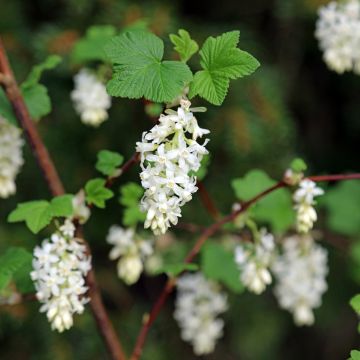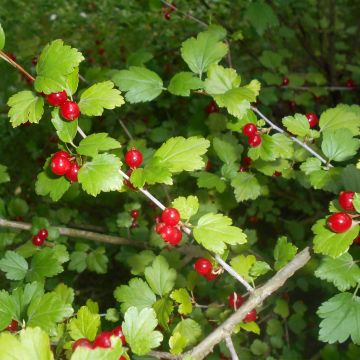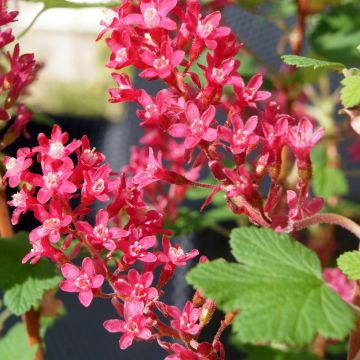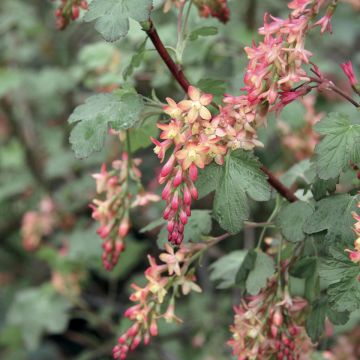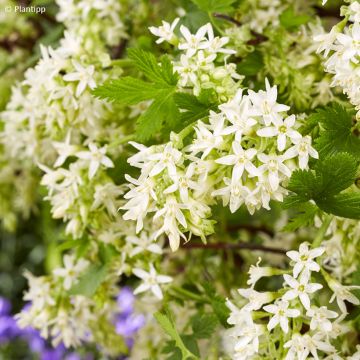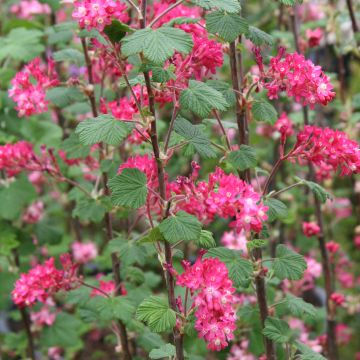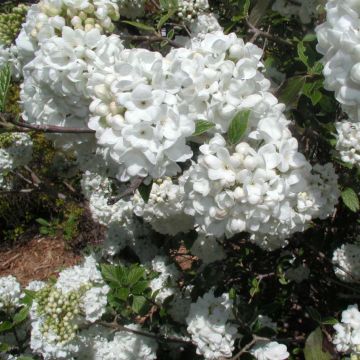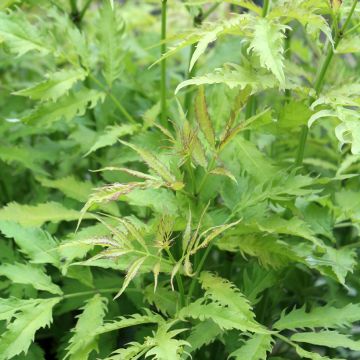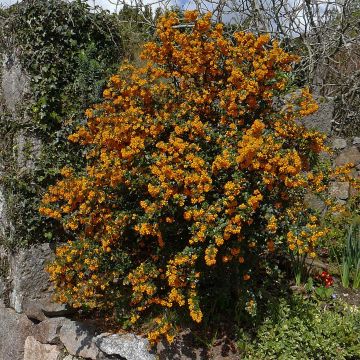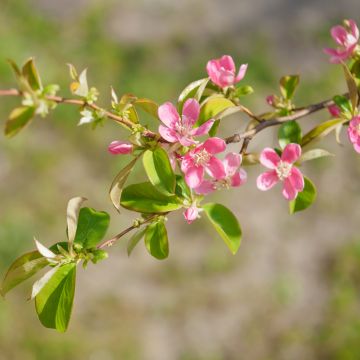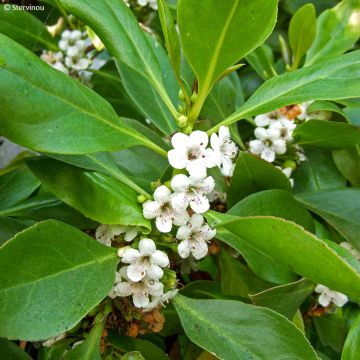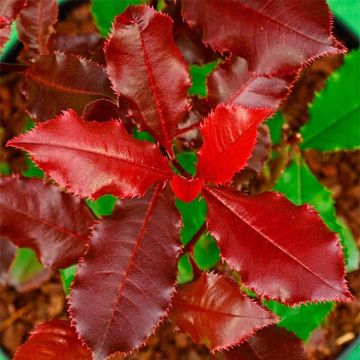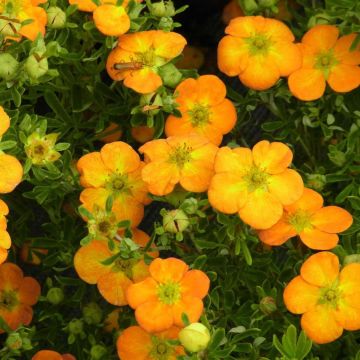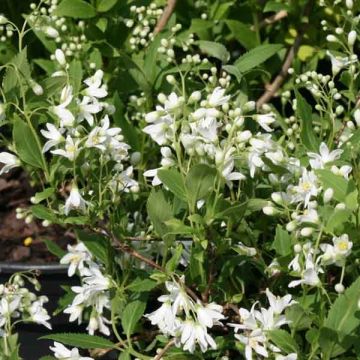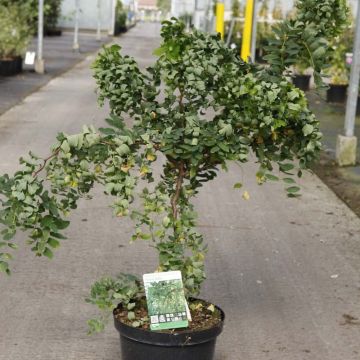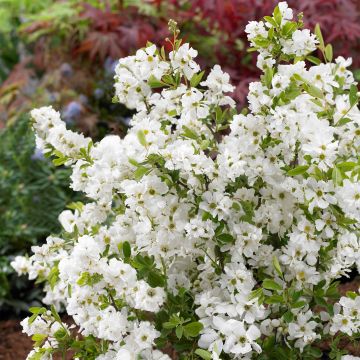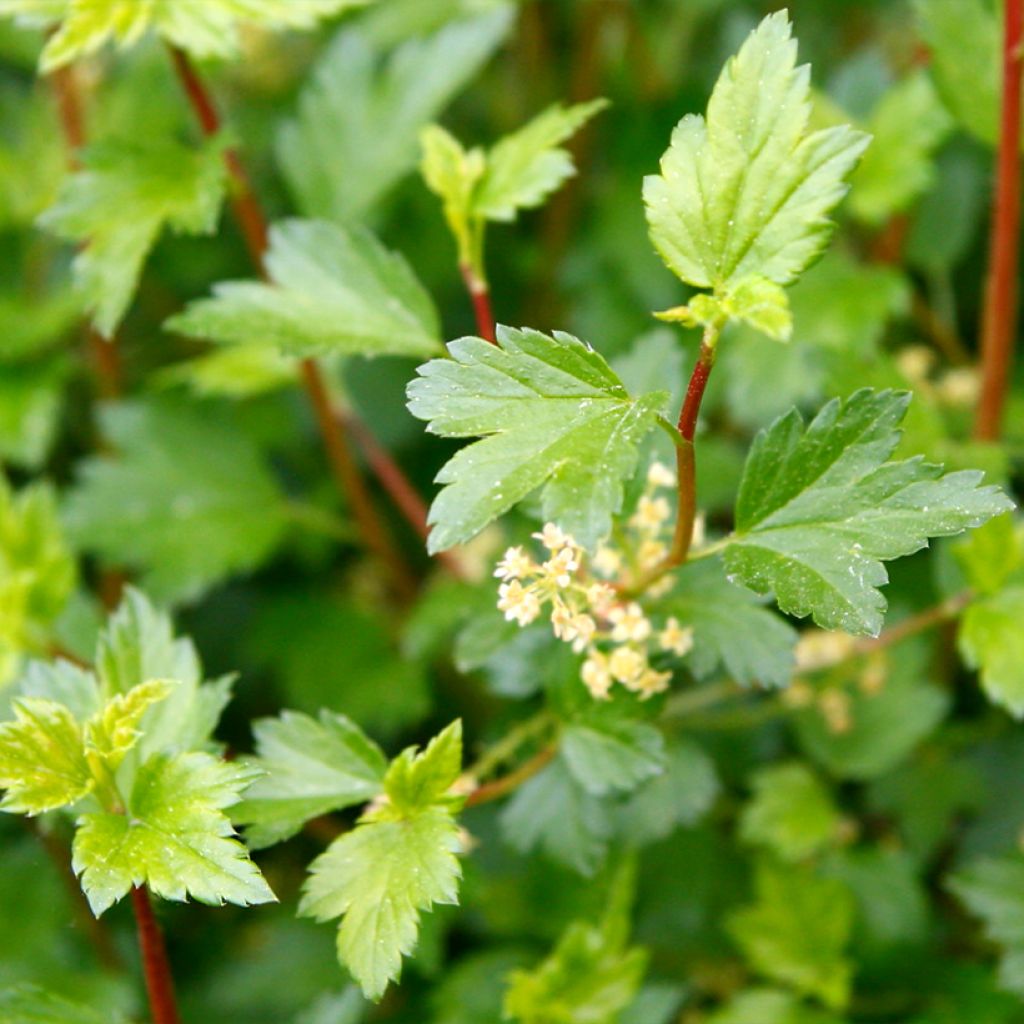

Ribes alpinum Schmidt - Groseiller des Alpes
Ribes alpinum Schmidt - Alpine Currant
Ribes alpinum Schmidt
Alpine Currant, Mountain Currant, Tasteless Mountain Currant
This plant carries a 24 months recovery warranty
More information
We guarantee the quality of our plants for a full growing cycle, and will replace at our expense any plant that fails to recover under normal climatic and planting conditions.
From €5.90 for pickup delivery and €6.90 for home delivery
Express home delivery from €8.90.
Does this plant fit my garden?
Set up your Plantfit profile →
Description
Ribes alpinum 'Schmidt' is a male variety of alpine currant selected for its vigour and dense vegetation. It is a deciduous bush that is very dense, perfectly resistant to cold, and capable of adapting to a wide range of soils. Its very dense foliage appears early in spring and falls late in autumn, providing valuable shelter for birds, while its abundant spring flowering feeds bees. Fast-growing and undemanding, this currant is perfect for planting in shrub borders, and wild or trimmed hedges, and can help to thicken a country hedge. This currant tolerates limestone, clay, deep shade, competition from large trees' roots, as well as urban pollution.
The Schmidt Alpine Currant belongs to the Grossulariaceae family. It is a male horticultural selection derived from the Ribes alpinum, a native species from northern Europe to Russia. This Schmidt variety averages 1.75 m (6 ft) in all directions, with excellent branching and a rounded bushy habit. Its young branches are light brown to greyish-brown, with bark peeling irregularly each year. In April, after leafing out, short upright racemes of 10 to 30 small yellow-green flowers appear, quite decorative. The deciduous foliage develops from the beginning of April, depending on the climate. It is composed of 3 to 5 cm (1 to 2 in) long leaves, divided into 3 to 5 dentate lobes along the edges, fresh green in colour, with a glossy underside. Before falling in autumn, the leaves turn yellow.
The Schmidt Alpine Currant will find its place in any garden, in a trimmed or untrimmed hedge, in shrub borders, or even as a standalone plant. While it is more floriferous in sunny exposure, it tolerates shade perfectly, which can be useful for thickening a north-facing hedge. You can plant it in a spring scene with lilacs, mock oranges, an Exochorda 'The Bride', or even with a hedge honeysuckle. Planted in groups of three or four, mixed together, flowering currants create an extraordinary effect, particularly at the back of perennial borders.
Report an error about the product description
Ribes alpinum Schmidt - Alpine Currant in pictures
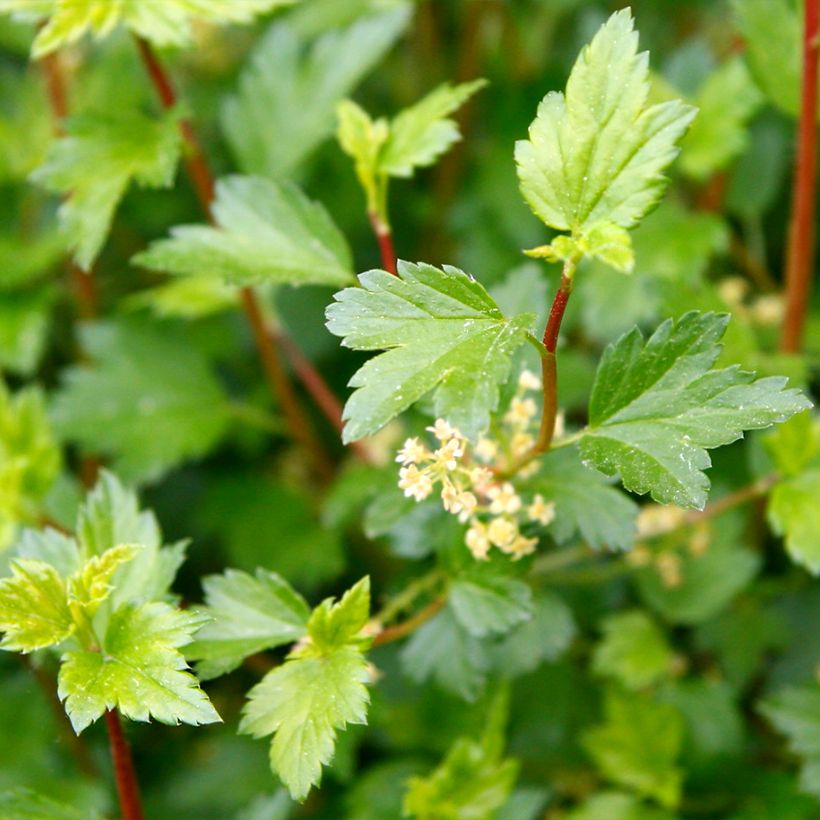

Plant habit
Flowering
Foliage
Botanical data
Ribes
alpinum
Schmidt
Grossulariaceae
Alpine Currant, Mountain Currant, Tasteless Mountain Currant
Alps
Other Ribes - Flowering Currants
Planting and care
Plant Ribes alpinum 'Schmidt' in ordinary, chalky, rich and clayey soil, moist to dry. This bush will thrive in shade, partial shade or in the sun, but will be more floriferous in the sun. Once established, it tolerates drought relatively well. The start of vegetation is early. When planting, do not hesitate to bury a portion of the collar to promote good rooting.
Planting period
Intended location
Care
This item has not been reviewed yet - be the first to leave a review about it.
Hedge shrubs
Haven't found what you were looking for?
Hardiness is the lowest winter temperature a plant can endure without suffering serious damage or even dying. However, hardiness is affected by location (a sheltered area, such as a patio), protection (winter cover) and soil type (hardiness is improved by well-drained soil).

Photo Sharing Terms & Conditions
In order to encourage gardeners to interact and share their experiences, Promesse de fleurs offers various media enabling content to be uploaded onto its Site - in particular via the ‘Photo sharing’ module.
The User agrees to refrain from:
- Posting any content that is illegal, prejudicial, insulting, racist, inciteful to hatred, revisionist, contrary to public decency, that infringes on privacy or on the privacy rights of third parties, in particular the publicity rights of persons and goods, intellectual property rights, or the right to privacy.
- Submitting content on behalf of a third party;
- Impersonate the identity of a third party and/or publish any personal information about a third party;
In general, the User undertakes to refrain from any unethical behaviour.
All Content (in particular text, comments, files, images, photos, videos, creative works, etc.), which may be subject to property or intellectual property rights, image or other private rights, shall remain the property of the User, subject to the limited rights granted by the terms of the licence granted by Promesse de fleurs as stated below. Users are at liberty to publish or not to publish such Content on the Site, notably via the ‘Photo Sharing’ facility, and accept that this Content shall be made public and freely accessible, notably on the Internet.
Users further acknowledge, undertake to have ,and guarantee that they hold all necessary rights and permissions to publish such material on the Site, in particular with regard to the legislation in force pertaining to any privacy, property, intellectual property, image, or contractual rights, or rights of any other nature. By publishing such Content on the Site, Users acknowledge accepting full liability as publishers of the Content within the meaning of the law, and grant Promesse de fleurs, free of charge, an inclusive, worldwide licence for the said Content for the entire duration of its publication, including all reproduction, representation, up/downloading, displaying, performing, transmission, and storage rights.
Users also grant permission for their name to be linked to the Content and accept that this link may not always be made available.
By engaging in posting material, Users consent to their Content becoming automatically accessible on the Internet, in particular on other sites and/or blogs and/or web pages of the Promesse de fleurs site, including in particular social pages and the Promesse de fleurs catalogue.
Users may secure the removal of entrusted content free of charge by issuing a simple request via our contact form.
The flowering period indicated on our website applies to countries and regions located in USDA zone 8 (France, the United Kingdom, Ireland, the Netherlands, etc.)
It will vary according to where you live:
- In zones 9 to 10 (Italy, Spain, Greece, etc.), flowering will occur about 2 to 4 weeks earlier.
- In zones 6 to 7 (Germany, Poland, Slovenia, and lower mountainous regions), flowering will be delayed by 2 to 3 weeks.
- In zone 5 (Central Europe, Scandinavia), blooming will be delayed by 3 to 5 weeks.
In temperate climates, pruning of spring-flowering shrubs (forsythia, spireas, etc.) should be done just after flowering.
Pruning of summer-flowering shrubs (Indian Lilac, Perovskia, etc.) can be done in winter or spring.
In cold regions as well as with frost-sensitive plants, avoid pruning too early when severe frosts may still occur.
The planting period indicated on our website applies to countries and regions located in USDA zone 8 (France, United Kingdom, Ireland, Netherlands).
It will vary according to where you live:
- In Mediterranean zones (Marseille, Madrid, Milan, etc.), autumn and winter are the best planting periods.
- In continental zones (Strasbourg, Munich, Vienna, etc.), delay planting by 2 to 3 weeks in spring and bring it forward by 2 to 4 weeks in autumn.
- In mountainous regions (the Alps, Pyrenees, Carpathians, etc.), it is best to plant in late spring (May-June) or late summer (August-September).
The harvesting period indicated on our website applies to countries and regions in USDA zone 8 (France, England, Ireland, the Netherlands).
In colder areas (Scandinavia, Poland, Austria...) fruit and vegetable harvests are likely to be delayed by 3-4 weeks.
In warmer areas (Italy, Spain, Greece, etc.), harvesting will probably take place earlier, depending on weather conditions.
The sowing periods indicated on our website apply to countries and regions within USDA Zone 8 (France, UK, Ireland, Netherlands).
In colder areas (Scandinavia, Poland, Austria...), delay any outdoor sowing by 3-4 weeks, or sow under glass.
In warmer climes (Italy, Spain, Greece, etc.), bring outdoor sowing forward by a few weeks.

































